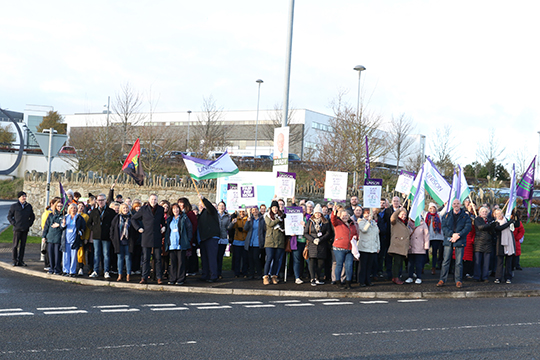McGrath expresses support for striking nursing staff
SDLP Health Spokesperson Colin McGrath has expressed the party’s solidarity with Royal College of Nursing members taking strike action over fair pay and safe working conditions.
Mr McGrath said it was deeply regrettable the situation had got to this stage without an agreement being reached.
He called on the British government to work with officials in the North to address nurses’ concerns and avert strike action.
The South Down MLA Mr McGrath said: “The SDLP stands fully behind nursing staff who have taken the difficult decision to commence strike action in an attempt to obtain fair pay, and safe conditions for both themselves and their patients.

“Three years ago our nurses went on strike and it prompted a significant political reaction, once again they are being failed by a generation of underfunding which has left our health service on the brink of collapse and put staff under unmanageable pressures.
“Our nurses should not have to keep fighting for fair pay. They do a tremendous job in increasingly difficult circumstances and helped hold our health service together during the coronavirus pandemic, with many putting themselves directly in harm’s way.
“How can we tell the people expected to look after us and our loved ones that they aren’t entitled to a decent wage, leaving many struggling to get by with the increasing costs of everything from food to fuel.
“It is important to recognise this strike action is not solely about pay. For years the concerns of nurses about conditions have been ignored.
“Due to the current pressures we are seeing more and more unsafe staffing situations in our hospitals and nurses are rightly fighting for legislative protections around the number of staff present to ensure patient safety on wards.
“We also need to address the lack of career progression opportunities for nurses in the North, that lag far behind those in Britain.
“The British government need to recognise the concerns of nurses across these islands and work with officials in Stormont to put forward proper proposals around pay and reform to address these issues.
“All nurses are asking for is fair treatment and the situation should never have been allowed to escalate to this stage.

Colin McGrath added: “I believe that if the will exists this strike can still be averted. Unfortunately, the situation is complicated by the DUP’s boycott of the Stormont institutions.
“But we need to put patients and nurses first in a way that recognises their concerns and isn’t another sticking plaster approach that will lead us back here in a few years’ time.”
DoH statement on RCN ballot result
The Department of Health has acknowledged the outcome of the RCN ballot on industrial action.
GMB members working in the NI health service have also voted for industrial action and ballots are ongoing at other health unions.
A DoH spokesperson said: “The Department shares the frustration of NI health care staff at the ongoing absence of a pay award for this year.
“Due to unprecedented circumstances, we have been unable to progress with national NHS pay body recommendations for 2022/23.
“A NI public sector pay policy is not in place for this year and very significant financial pressures are facing this Department and the wider NI public sector.
“We will continue to liaise with the Northern Ireland Office in relation to our financial position.
“We greatly value our health care staff and very much regret that so many of them believe industrial action is necessary.
“NI’s health and social care system is planning for a very difficult winter period.
“In the event of strike action proceeding, the Department and HSC Trusts will work closely with trade unions with a view to protecting critical services as much as possible.
“However, there will inevitably be an impact on patient care, and further impairment of already highly pressurised services.”
Waiting lists may grow even longer, and critical health cases and treatments may be delayed.
























